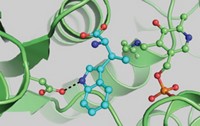Advertisement
Grab your lab coat. Let's get started
Welcome!
Welcome!
Create an account below to get 6 C&EN articles per month, receive newsletters and more - all free.
It seems this is your first time logging in online. Please enter the following information to continue.
As an ACS member you automatically get access to this site. All we need is few more details to create your reading experience.
Not you? Sign in with a different account.
Not you? Sign in with a different account.
ERROR 1
ERROR 1
ERROR 2
ERROR 2
ERROR 2
ERROR 2
ERROR 2
Password and Confirm password must match.
If you have an ACS member number, please enter it here so we can link this account to your membership. (optional)
ERROR 2
ACS values your privacy. By submitting your information, you are gaining access to C&EN and subscribing to our weekly newsletter. We use the information you provide to make your reading experience better, and we will never sell your data to third party members.
Synthesis
Engineered enzyme delivers branched tryptophans
Directed evolution produces a biocatalyst to build β-branched tryptophan analogs in one step
by Louisa Dalton, special to C&EN
August 1, 2016
| A version of this story appeared in
Volume 94, Issue 31

Dressing up amino acids by adding new substituent groups to them can introduce novel catalytic and medicinal properties. Adding a methyl group to tryptophan’s β carbon, however, has proven difficult and inefficient. A research team has now used directed evolution to produce an enzyme that catalyzes the synthesis of β-methyltryptophan analogs in just one step (J. Am. Chem. Soc. 2016, DOI: 10.1021/jacs.6b04836). Andrew R. Buller, Frances H. Arnold, and colleagues at California Institute of Technology discovered that a subunit of tryptophan synthase can construct β-methyltryptophan from indole and the amino acid threonine, but the activity was weak. So they randomly mutated the enzyme, looked for mutants with increased production of β-methyltryptophan, and then recombined genes coding for the most active variants. The researchers ended up with an enzyme that had eight mutations and was 1,000 times as active in making β-methyltryptophan as the natural tryptophan synthase. Incorporating substituted indoles led to a whole family of β-branched tryptophans.





Join the conversation
Contact the reporter
Submit a Letter to the Editor for publication
Engage with us on Twitter